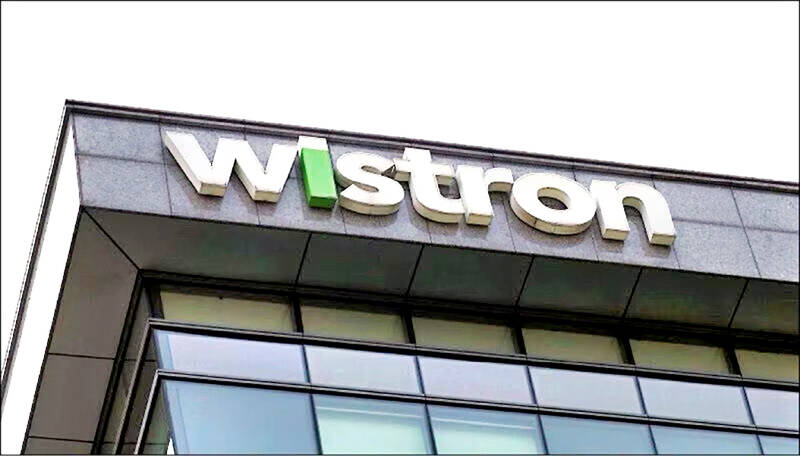Wistron Corp (緯創), which supplies graphics processing unit (GPU) server modules to Nvidia Corp, yesterday reported its strongest first-quarter net profit of NT$3.52 billion (US$108.60 million), driven by robust artificial intelligence (AI) server demand.
That was a 5.6 percent expansion from NT$3.34 billion in the fourth quarter last year.
On an annual basis, net profit spiked from NT$174 million in the first quarter of last year, aided by foreign exchange gains of NT$2 billion in the first quarter.

Photo: EPA
Earnings per share rose to NT$1.24 last quarter, compared with NT$1.18 in the fourth quarter of last year and NT$0.06 in the first quarter of last year.
Gross margin dropped to 7.2 percent last quarter from 9.29 percent in the prior quarter. However, that was still an improvement from 7.01 percent a year earlier.
Wistron yesterday said it booked an asset disposal loss of US$4.6 million last quarter from a deal in which it sold iPhone assembling facilities in India to Tata Electronics Private Ltd for US$130.8 million.
The company said it plans to raise capital expenditure for its plant in Hsinchu County’s Hukou Township (湖口) to US$2.29 billion, up about 43 percent from its original budget of NT$1.6 billion, to cope with new business development and strategic planning needs.
Based on the new budget, the machinery and equipment investment would increase to NT$1.73 billion from NT$1.13 billion, while the investment in building improvements would go up to NT$563 million from NT$472 million, Wistron said.
Wistron makes servers, industrial computers, AI and networking devices at the Hukou plant.
The company in March said that revenue from AI products — GPU-based AI servers, GPU accelerator cards, AI modules and AI systems — would triple this year on an annual basis.
Total capital spending this year would stand at NT$14 billion on account of capacity expansions in Taiwan, Vietnam and Mexico, the company said.
It also plans to inject fresh capital of US$15.5 million into Alpha EMS Corp, its newly acquired, wholly owned US subsidiary, to meet its capital expenditure and operational funding requirements, Wistron said.
Additionally, Alpha EMS would lease a facility from LIPT BIXBY III LLC in California. It would also obtain right-of-use assets for real-estate acquisitions within a limit of US$24.85 million for a period of 10 years and four months.

SEEKING CLARITY: Washington should not adopt measures that create uncertainties for ‘existing semiconductor investments,’ TSMC said referring to its US$165 billion in the US Taiwan Semiconductor Manufacturing Co (TSMC, 台積電) told the US that any future tariffs on Taiwanese semiconductors could reduce demand for chips and derail its pledge to increase its investment in Arizona. “New import restrictions could jeopardize current US leadership in the competitive technology industry and create uncertainties for many committed semiconductor capital projects in the US, including TSMC Arizona’s significant investment plan in Phoenix,” the chipmaker wrote in a letter to the US Department of Commerce. TSMC issued the warning in response to a solicitation for comments by the department on a possible tariff on semiconductor imports by US President Donald Trump’s

The government has launched a three-pronged strategy to attract local and international talent, aiming to position Taiwan as a new global hub following Nvidia Corp’s announcement that it has chosen Taipei as the site of its Taiwan headquarters. Nvidia cofounder and CEO Jensen Huang (黃仁勳) on Monday last week announced during his keynote speech at the Computex trade show in Taipei that the Nvidia Constellation, the company’s planned Taiwan headquarters, would be located in the Beitou-Shilin Technology Park (北投士林科技園區) in Taipei. Huang’s decision to establish a base in Taiwan is “primarily due to Taiwan’s talent pool and its strength in the semiconductor

Industrial production expanded 22.31 percent annually last month to 107.51, as increases in demand for high-performance computing (HPC) and artificial intelligence (AI) applications drove demand for locally-made chips and components. The manufacturing production index climbed 23.68 percent year-on-year to 108.37, marking the 14th consecutive month of increase, the Ministry of Economic Affairs said. In the first four months of this year, industrial and manufacturing production indices expanded 14.31 percent and 15.22 percent year-on-year, ministry data showed. The growth momentum is to extend into this month, with the manufacturing production index expected to rise between 11 percent and 15.1 percent annually, Department of Statistics

An earnings report from semiconductor giant and artificial intelligence (AI) bellwether Nvidia Corp takes center stage for Wall Street this week, as stocks hit a speed bump of worries over US federal deficits driving up Treasury yields. US equities pulled back last week after a torrid rally, as investors turned their attention to tax and spending legislation poised to swell the US government’s US$36 trillion in debt. Long-dated US Treasury yields rose amid the fiscal worries, with the 30-year yield topping 5 percent and hitting its highest level since late 2023. Stocks were dealt another blow on Friday when US President Donald